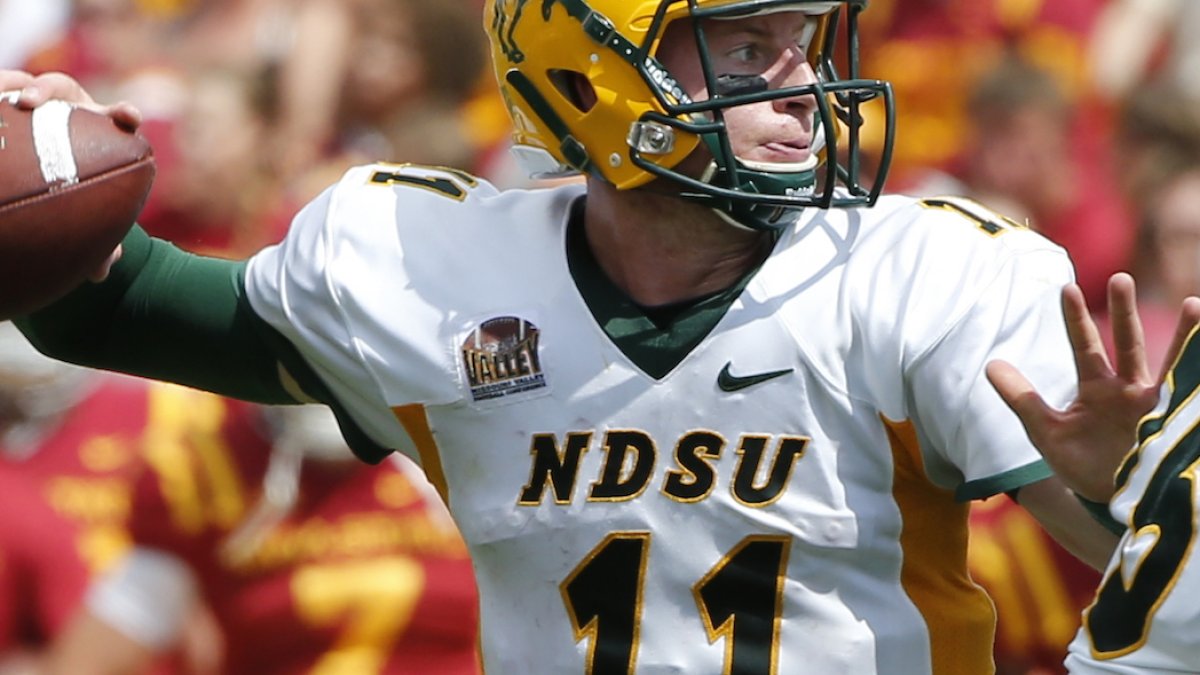The 2016 NFL Draft is finally here, and the challenge is to figure out how all of these rookies will perform during their first season in the league. When discussing rookies from a fantasy perspective, running backs are the most interesting position, followed by wideouts. Tight ends are often lumped together with wideouts given that they are both pass-catchers.
That leaves us with quarterbacks — often the crown of the real draft, but the least intriguing position from a fantasy perspective. That’s because rookie quarterbacks rarely make a big impact on the fantasy scene. Robert Griffin III did it back in 2012, and Cam Newton did it in 2011, but examples of bonafide rookie QB1s are typically few and far between.
Additionally, Griffin III and Newton made waves their rookie seasons largely because of their legs, and the ability to rack up the points on the ground isn't a skill shared by all quarterbacks. For what it’s worth, Russell Wilson finished as the 11th-highest scoring quarterback his rookie season — thanks to his 489 rushing yards, third behind Griffin III and Newton that season — and Jameis Winston was QB13 last season, thanks to his six rushing scores (second behind Newton).
That’s a short history and far from in-depth analysis, but it’s easy to deduce that the best fantasy rookie quarterbacks in recent history have been aided by their legs.
But what does the average rookie quarterback bring to the table when the rushing game is removed from the equation? After all, the vast majority of a quarterback’s fantasy points are still generated through the air. We broke it down for you.
The short answer is that rookie quarterbacks are roughly 14 percent less efficient when it comes to scoring fantasy points than their veteran counterparts. From 2007-2015, rookie quarterbacks averaged 0.37 fantasy points per attempt (minimum 250 attempts). During that same timespan, the average of all quarterbacks was 0.43 fantasy points per attempt.
Rookie quarterbacks completed 58.2 percent of their passes in that span, compared to 61.3 percent for all quarterbacks. That represents only about a five percent difference, so completion percentage alone doesn’t explain the 14 percent difference in overall efficiency. Rookies also averaged roughly 5.5 percent fewer yards per attempt than all quarterbacks (6.69 vs. 7.08), which makes sense, given the difference in completion percentage.
A rookie quarterback’s average depth of target (aDOT) is 7.15, slightly below a typical quarterback’s 7.47 aDOT. That represents about a four percent difference. Rookies are no different from a typical quarterback when it comes to yards gained after the catch, however, with both checking in 46 percent. (In other words, 46 percent of an average quarterback’s total yards are YAC yards — the same number as rookies.) Rookie quarterbacks see their pass-catchers gain about 5.28 YAC, compared to 5.31 YAC for all quarterbacks.
Where, then, do rookie quarterbacks lose so much ground to their veteran counterparts when it comes to fantasy efficiency? The answer rests in their respective touchdown and interception numbers.
The average rookie quarterback from 2007-2015 threw a touchdown on 3.46 percent of their passes. On average, all quarterbacks threw a touchdown on 4.34 percent of their passes. That represents a difference of over 20 percent. Rookie quarterbacks also throw interceptions at a 10 percent higher rate.
Rookie quarterbacks are roughly five percent behind other quarterbacks in many categories, but in the category that’s worth the most — touchdowns — they are over 20 percent behind. Rookies do have a chance to make up some ground later in the game, as they see over 23 percent more garbage-time snaps than other quarterbacks, but it’s not enough to make up the difference.
Speaking of late-game plays, I also broke down rookie quarterback performance (and all quarterback performance) by half. Generally, both groups performed worse in the second half of games compared to the first half, but rookies saw their performance drop off a much steeper cliff.
All quarterbacks had a touchdown rate of 4.33 percent in the first half of games and a similar rate of 4.34 percent in the second half of games. Rookies, however, see their touchdown rate drop from 3.87 percent in the first half to just 3.06 in the second half. That represents a 21 percent drop in touchdown scoring efficiency from the first half to the second half, while the average quarterback actually slightly increases their touchdown rate (one of the few categories in which they actually perform better in the second half).
Rookies also throw over 33 percent more interceptions in the second half of games compared to the first half; the average rate of increase for all quarterbacks is 21 percent.
In all, rookie quarterbacks are roughly 23 percent less efficient at scoring fantasy points in the second half of games compared to all quarterbacks (0.43 fantasy points per attempt vs. 0.35 fantasy points per attempt).
That runs counterpart to what one might expect — if rookies are getting garbage time more often, shouldn’t they be racking up the points late in the game? — but it’s the reality. Whether it's late-game pressure, forced decisions in a bid to catch up, or something else, rookie quarterbacks are typically far worse than average when it comes to fantasy efficiency in the second half of games.
This deep dive into quarterback statistics was not meant to drive you away from rookie quarterbacks. Will Goff, Wentz and others be worth studying before your fantasy draft this season? Of course — and PFF Fantasy will be sure to bring you analysis specific to those players and more.
All of the numbers above deal with averages, and no two situations are alike. But the data does prove something we already knew: Rookie quarterbacks aren’t as good from a fantasy perspective as veterans. These numbers help quantify just how big the difference is.


 © 2024 PFF - all rights reserved.
© 2024 PFF - all rights reserved.